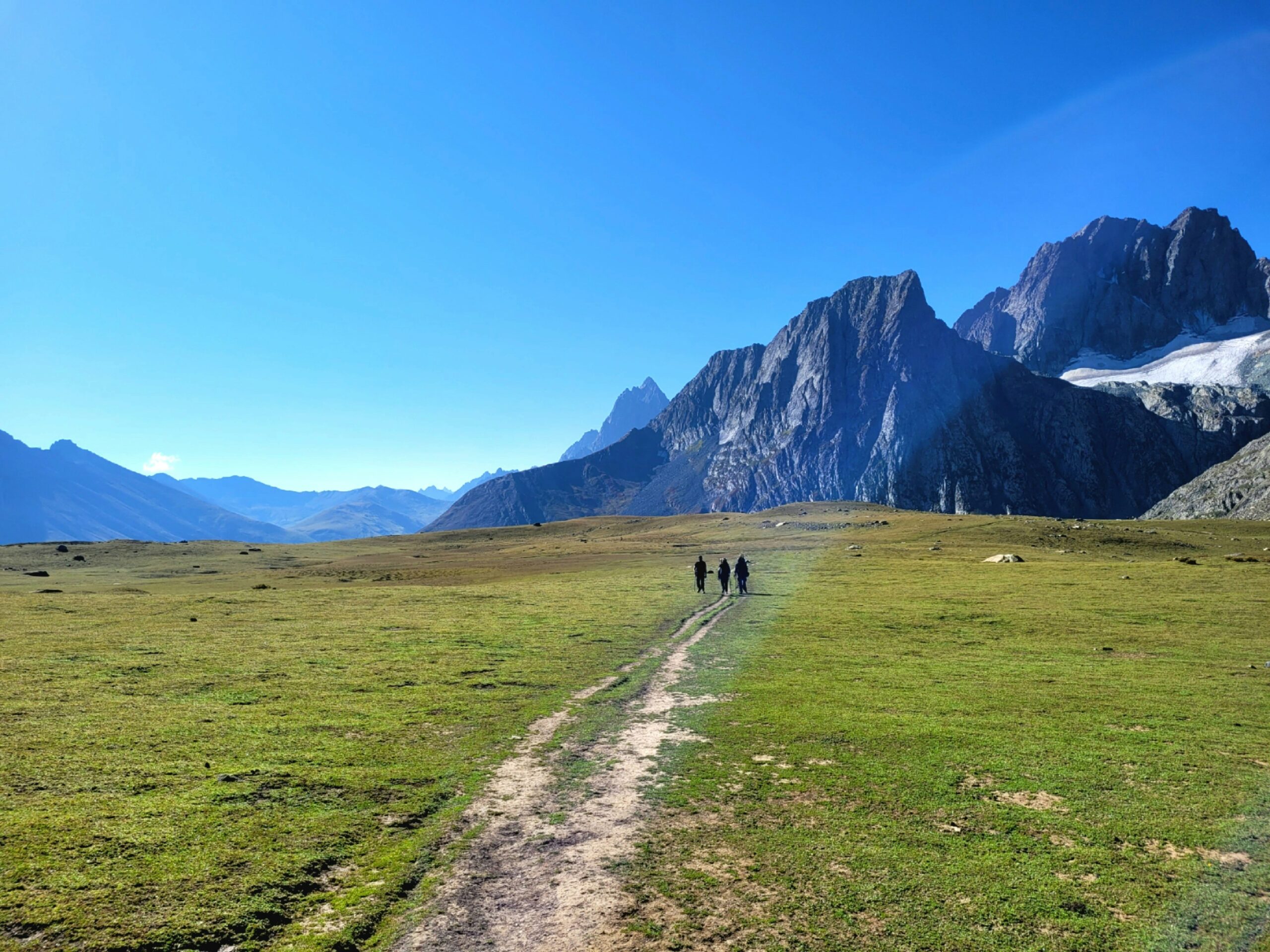kashmir great lakes trek 2024: Dive into the captivating beauty of Kashmir’s Great Lakes trek, where adventure meets tranquility. Traverse valleys adorned with vibrant wildflowers, their colors painting the landscape in a breathtaking array. Stroll beside glacial lakes reflecting the azure sky, each step immersing you in nature’s splendor. Encounter charming shepherd settlements nestled amidst rolling hills, offering a glimpse into the region’s rich cultural heritage. Experience the magic of the Himalayas on this unforgettable journey.
Ready for the Challenge?
Embark on an adventure where each step reveals new wonders and challenges. The Kashmir Great Lakes Trek 2024 Lakes trek isn’t just about physical exertion; it’s a journey of self-discovery amidst breathtaking landscapes.
Can you navigate picturesque valleys, conquer mountain passes, and camp under starlit skies?
Each day promises new challenges and discoveries, from steep mountain passes to serene camping spots beneath the vast night sky. Gear up, embrace the adventure, and get ready to experience the magic of trekking in Kashmir’s Great Lakes region!
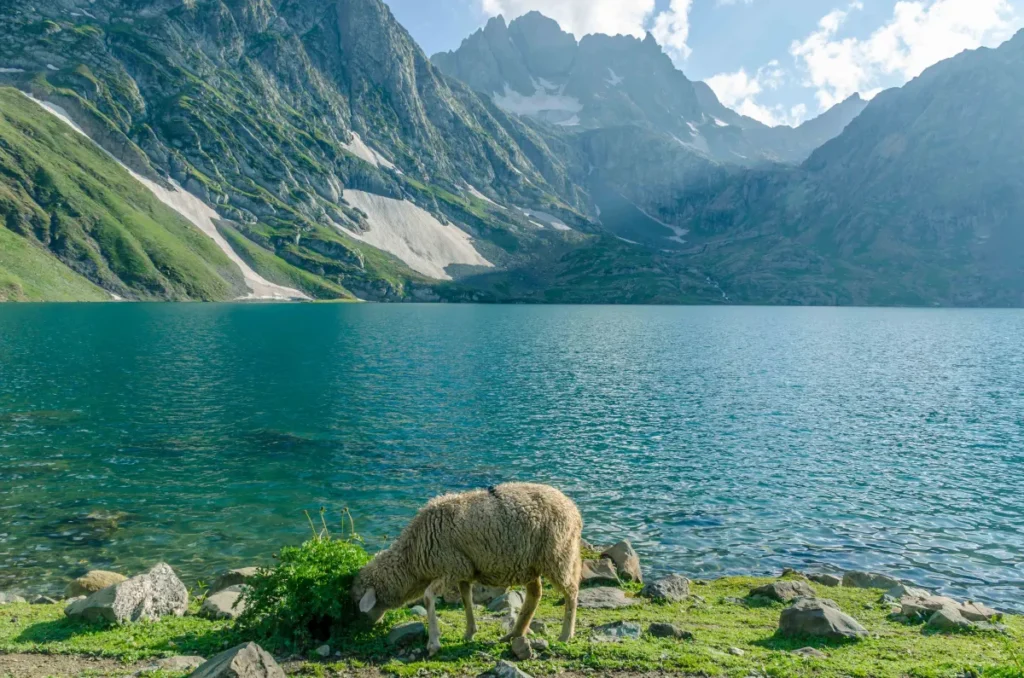
When to Go for Kashmir Great Lakes Trek:
- Ideal season: June to September offers pleasant weather and clear skies.
- Shoulder seasons: May and October are less crowded but weather can be unpredictable.
- Winter: Avoid December to March due to heavy snowfall and trekking closures.
Reaching Sonamarg, the Trek Starting Point:
By Air:
- Fly to Srinagar Airport (SXR).
- Cost: ₹ 5,000 – ₹ 12,000 (USD 68 – $162) depending on season and booking time.
- Book a taxi or shared cab from Srinagar to Sonamarg (2-3 hours).
By Train:
- Take a train to Jammu Tawi Railway Station (JAT).
- Cost: ₹ 500 – ₹ 2,000 (USD 7 – $27).
- Hire a taxi or cab from Jammu to Sonamarg (4-5 hours).
Permits and Responsibility:
- Indians: ₹ 1,500 – ₹ 2,000 (USD 20 – $27) permit required.
- Foreigners: ₹ 5,000 – ₹ 6,000 (USD 68 – $81) permit required.
- Respect local customs and traditions.
- Leave no trace and practice responsible tourism.
Your Expedition Through Time and Terrain:
Day 1:
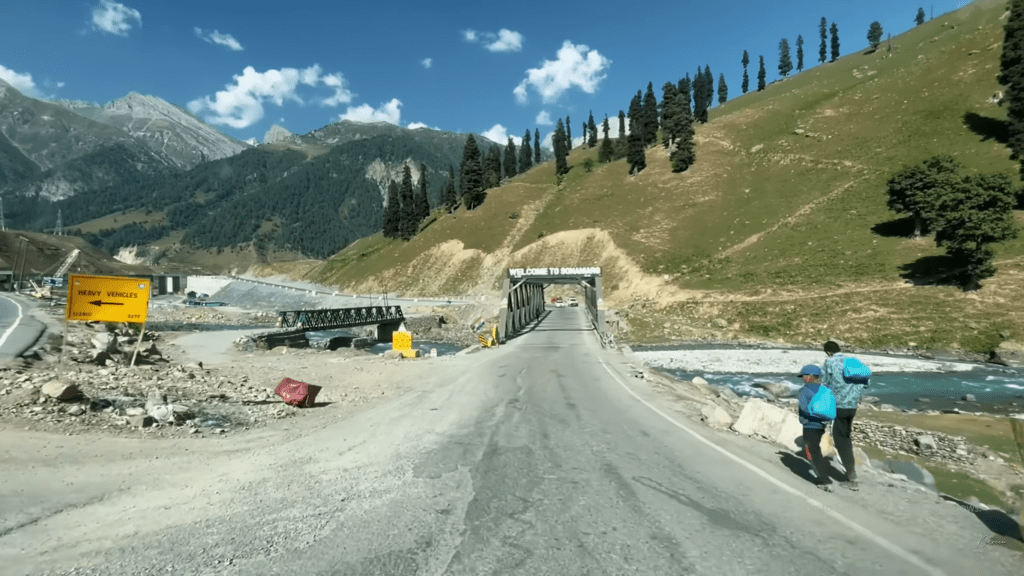
Srinagar, Kashmir’s bustling heart, welcomes you with open arms, setting the stage for your Kashmir Great Lakes adventure. Wander through its colorful markets, where the vibrant energy of the city intertwines with the historical whispers of its old streets. Here, you can stock up on essential supplies for your Kashmir Great Lakes journey.
Your Kashmir Great Lakes adventure is just beginning, and the memories made in Srinagar and Sonamarg will be the perfect prelude to the breathtaking landscapes and serene waters you’ll encounter. Embrace the beauty, the culture, and the camaraderie as you embark on this unforgettable journey through the Kashmir Great Lakes.
Day 2:
Get ready to be dazzled as your Kashmir Great Lakes trek begins! This remarkable journey leads you through meadows bursting with wildflowers, showcasing the pristine beauty of the Kashmir Great Lakes region. You’ll trek alongside the gurgling Lidder River, its soothing sounds accompanying you on your adventure.
Your first stop on the Kashmir Great Lakes trek is the mesmerizing Gangabal Lake, a true gem in the Kashmir Great Lakes circuit. The crystal-clear waters of Gangabal Lake reflect the snow-capped peaks like a giant mirror, creating a breathtaking sight that epitomizes the beauty of the Kashmir Great Lakes.
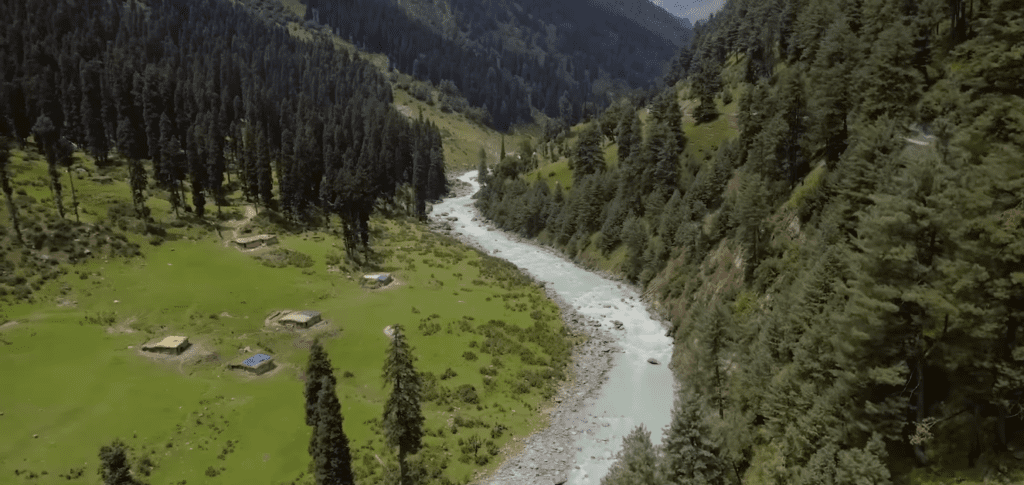
Day 3:
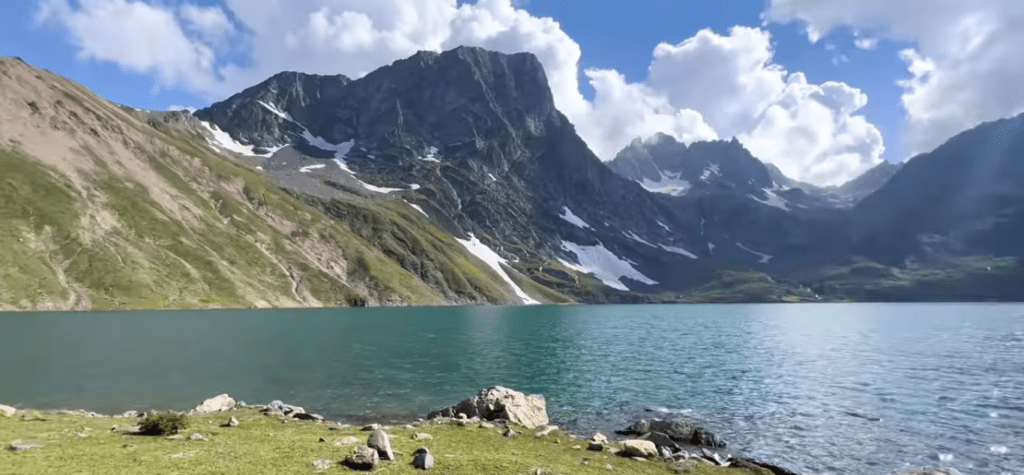
Onwards we go! Today, you’ll traverse meadows dotted with grazing horses and quaint shepherd huts, eventually reaching the enchanting Kisharsar Lake. Imagine its emerald hues sparkling under the sun, inviting you for a leisurely afternoon by its shores. Soak it all in, capture the magic, and create memories that will last a lifetime.
Day 4:
Feeling adventurous? Get ready for a slightly challenging ascent towards Gadsar Pass. But trust me, the panoramic views of the surrounding valleys and distant peaks are worth every step! After conquering the pass, descend towards another gem – the heart-shaped Satsar Lake. Set up camp here, surrounded by beauty, and let the stars guide you to sleep.
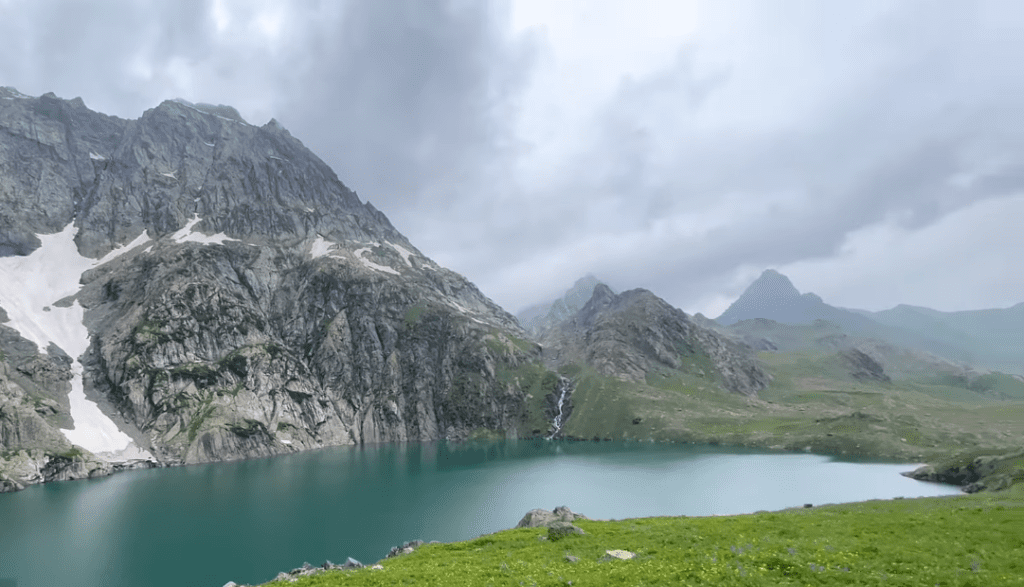
Day 5:
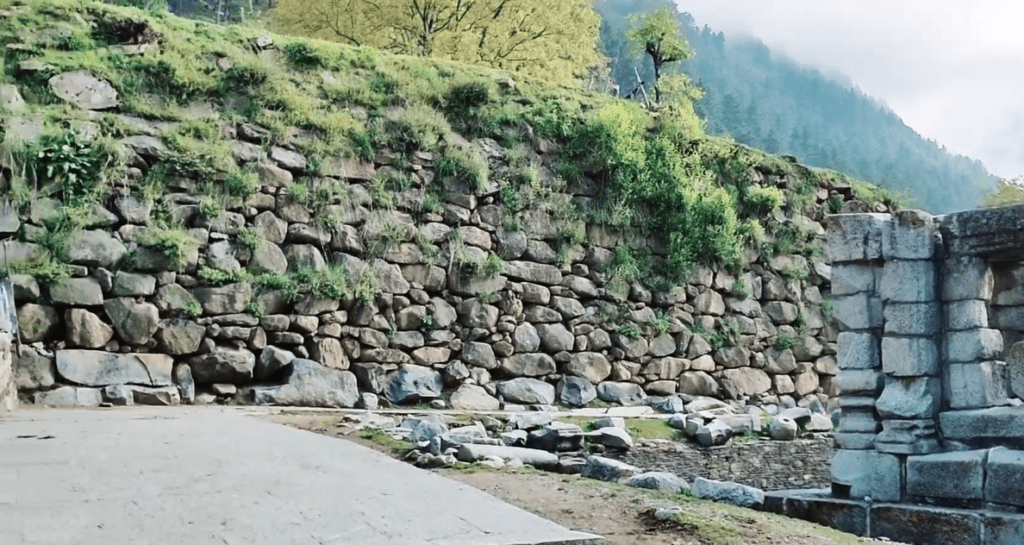
Rise and shine with the sunrise painting the peaks in warm hues. Today’s the final leg of your trek, and it takes you through lush forests and meadows until you reach Naranag, a charming village where you can celebrate your accomplishment. High fives and victory dances are definitely encouraged!
Day 6 & 7:
It’s time to bid farewell to the mountains, but not to the memories. As you drive back to Srinagar, cherish the turquoise lakes, verdant valleys, and the warmth of Kashmiri hospitality you experienced. This trek isn’t just about reaching the destination; it’s about the journey, the connections you make, and the peace you find amidst nature’s embrace.
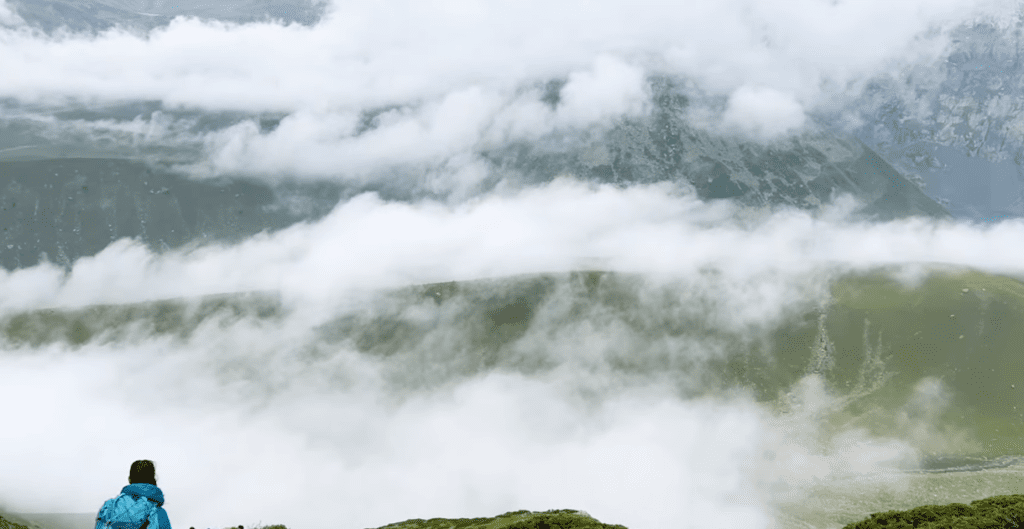
Remember: This is just a glimpse, and your actual adventure might differ based on weather, your chosen guide, and your personal preferences. But one thing’s for sure: the Great Lakes Trek promises an unforgettable escape, leaving you yearning for more of Kashmir’s magic. So, pack your bags, lace up your boots, and get ready to be enchanted!
Packing Essentials:
Footwear and Clothing:
- Comfortable Hiking Boots with Ankle Support:
- Invest in high-quality hiking boots that offer excellent ankle support. The rugged terrain of the Kashmir Great Lakes trek demands durable and comfortable footwear to prevent injuries and ensure a pleasant trekking experience.
- Warm Layers for Varying Altitudes:
- The temperatures can vary significantly as you ascend to higher altitudes. Pack thermal layers, fleece jackets, and a down jacket to stay warm during chilly nights and early mornings. Layering allows you to adjust your clothing based on the weather conditions.
- Rain Gear:
- Weather in the mountains can be unpredictable. A waterproof jacket and pants are essential to keep you dry and comfortable during unexpected rain showers. Consider packing a lightweight poncho as an additional layer of protection.
Gear and Accessories:
- Backpack (30-40 Liters):
- A sturdy backpack with a capacity of 30-40 liters is ideal for carrying your essentials. Ensure it has a comfortable fit, padded shoulder straps, and a hip belt to distribute the weight evenly.
- Headlamp:
- A reliable headlamp is crucial for navigating in low-light conditions. It’s especially useful for early morning starts, late-night camp activities, and emergencies. Carry extra batteries or a portable charger if your headlamp is rechargeable.
- Water Purification Tablets:
- Safe drinking water is essential. Carry water purification tablets or a portable water filter to ensure you have access to clean water throughout the trek. Staying hydrated is key to maintaining energy levels and preventing altitude sickness.
Protection and Health:
- Sunscreen and Insect Repellent:
- Protect your skin from the harsh mountain sun with a high-SPF sunscreen. Insect repellent is essential to ward off mosquitoes and other insects, especially in the lower altitude meadows.
- First-Aid Kit:
- A well-stocked first-aid kit is a must-have. Include adhesive bandages, antiseptic wipes, pain relievers, blister treatment, and any personal medications. It’s also wise to carry altitude sickness medication as a precaution.
Optional Items:
- Trekking Poles:
- Trekking poles provide additional stability and reduce the strain on your knees during steep ascents and descents. They can be particularly helpful on uneven terrain.
- Sunglasses:
- Protect your eyes from the strong UV rays at high altitudes with a good pair of sunglasses. Polarized lenses can reduce glare from snow and water.
- Hat and Gloves:
- A wide-brimmed hat offers sun protection, while a warm hat and gloves are essential for colder conditions. Choose moisture-wicking materials to keep dry and comfortable.
- Sleeping Bag:
- While some treks provide sleeping bags, bringing your own can ensure cleanliness and comfort. Choose a sleeping bag suitable for low temperatures.
- Portable Charger and Cables:
- Keep your electronic devices charged, especially if you use your phone for navigation, photography, or emergency contact. A solar charger can be beneficial in areas with limited power sources.
- Personal Hygiene Items:
- Pack biodegradable soap, hand sanitizer, toothbrush, toothpaste, and wet wipes. Maintaining personal hygiene is crucial, especially during a multi-day trek.
- Snacks and Energy Bars:
- Carry high-energy snacks like nuts, dried fruits, and energy bars to keep your energy levels up during long trekking days. They can be a great morale booster when you need a quick pick-me-up.
- Camera or Smartphone:
- Capture the stunning landscapes and memorable moments of your Kashmir Great Lakes trek. Ensure you have enough storage space and extra batteries or a power bank.
- Map and Compass or GPS Device:
- While most treks are guided, having a map and compass or a GPS device can be useful for navigation and gives you peace of mind.
Budget Breakdown:
Permits:
- Indians: ₹ 1,500 – ₹ 2,000 (USD 20 – $27)
- Foreigners: ₹ 5,000 – ₹ 6,000 (USD 68 – $81)
Transportation:
- Flights: ₹ 5,000 – ₹ 12,000 (USD 68 – $162) depending on season and booking time.
Local transport:
- Shared taxi: ₹ 500 – ₹ 700 (USD 7 – $9) per person.
- Private taxi: ₹ 2,000 – ₹ 3,000 (USD 27 – $41).
Accommodation:
- Homestays/Guesthouses: ₹ 1,000 – ₹ 2,500 (USD 14 – $34) per night depending on location and facilities.
Camping:
- Tented camps: ₹ 500 – ₹ 1,000 (USD 7 – $14) per night including meals and basic amenities.
- Own camping gear: Free (rental cost saved) but consider porter fees.
Food:
- Local meals at guesthouses/camps: ₹ 800 – ₹ 1,500 (USD 11 – $20) per day.
- Carrying your own food: ₹ 500 – ₹ 800 (USD 7 – $11) for the entire trek based on dietary needs.
Other Expenses:
- Guide fees: ₹ 1,500 – ₹ 2,500 (USD 20 – $34) per day depending on group size and experience.
- Horse rental (optional): ₹ 1,000 – ₹ 2,000 (USD 14 – $27) per day for luggage or personal use.
- Contingency: ₹ 2,000 – ₹ 3,000 (USD 27 – $41) for unexpected costs.
Bonus Tips:
Acclimatization:
- Acclimatize in Srinagar:
- Spend a few days in Srinagar before starting your Kashmir Great Lakes trek to acclimatize to the altitude. Acclimatization helps your body adjust to the reduced oxygen levels and minimizes the risk of altitude sickness. During this time, explore the beautiful Dal Lake, Mughal Gardens, and the bustling markets of Srinagar.
Safety and Guidance:
- Hire a Registered Guide:
- Consider hiring a registered guide for safety and navigation during your Kashmir Great Lakes trek. A local guide can provide valuable insights into the region’s culture, flora, and fauna, as well as ensure you stay on the correct path. They are also well-equipped to handle any emergencies that may arise during the Kashmir Great Lakes trek.
Packing Efficiency:
- Pack Light and Multi-functional Gear:
- Pack light to make your Kashmir Great Lakes trek more comfortable. Focus on multi-functional gear that can serve multiple purposes. For example, a lightweight, quick-drying towel can be used for bathing and as a scarf. A multi-tool can come in handy for various tasks during the Kashmir Great Lakes trek.
Hydration and Respect:
- Stay Hydrated:
- Hydration is key to maintaining your energy levels and preventing altitude sickness during the Kashmir Great Lakes trek. Drink plenty of water throughout the day, even if you don’t feel thirsty. Carry a reusable water bottle and refill it whenever you get the chance. Adding electrolytes to your water can also help maintain your energy levels during the Kashmir Great Lakes trek.
- Respect Local Customs and Traditions:
- The Kashmir Great Lakes trek passes through areas inhabited by local communities. Respect their customs and traditions by dressing modestly, seeking permission before taking photographs, and being courteous. Engage with the locals to learn about their way of life and support local businesses by purchasing handicrafts and other items during your Kashmir Great Lakes trek.
Environmental Responsibility:
- Leave No Trace:
- Practice the principles of “Leave No Trace” to minimize your impact on the environment during your Kashmir Great Lakes trek. Pack out all your trash, including biodegradable items, and avoid disturbing wildlife. Stick to established trails to prevent soil erosion and damage to vegetation. Use biodegradable soap for washing and avoid contaminating water sources during the Kashmir Great Lakes trek.
- Be a Responsible Trekker:
- Being a responsible trekker means taking care of yourself, your group, and the environment during the Kashmir Great Lakes trek. Follow the trek guidelines, stay on marked trails, and avoid shortcuts. Be mindful of your surroundings and report any issues, such as litter or damaged trails, to the local authorities or your guide during the Kashmir Great Lakes trek.
Conclusion:
The Kashmir Great Lakes trek offers an escape from the ordinary, a chance to reconnect with nature, and discover hidden gems in the pristine wilderness. This trek takes you through some of the most breathtaking landscapes, with snow-capped peaks, lush meadows, and crystal-clear alpine lakes that reflect the sky in a mesmerizing display of colors. As you traverse this stunning terrain, you’ll encounter serene valleys, dense forests, and picturesque campsites that make every moment a cherished memory.
With careful planning and preparation, you can embark on an unforgettable adventure that will leave you yearning for more. Start by mapping out your route, ensuring you have all the necessary gear, and acclimatizing to the altitude before setting off. The trek is moderately challenging, so make sure you’re physically prepared for the journey ahead.
Once you set foot on the trail, you’ll be greeted by the tranquil beauty of the Great Lakes. Each lake, from Vishansar to Gadsar, offers a unique spectacle, surrounded by rugged mountains and verdant landscapes. The sight of these emerald lakes, nestled in the heart of the Himalayas, will captivate your senses and provide a sense of peace and fulfillment.
Throughout your trek, take the time to immerse yourself in the local culture and traditions. Interact with the friendly villagers, savor the local cuisine, and learn about the history and folklore that add depth to this enchanting region. The hospitality of the Kashmiri people will make you feel at home, even in the most remote corners of the trek.
As you lace up your boots and prepare for this journey, remember to respect the environment and practice responsible trekking. Leave no trace, carry back all your waste, and preserve the natural beauty for future adventurers. The Great Lakes trek is not just a physical journey, but a spiritual one that connects you with the essence of nature.
So, pack your bags, lace up your boots, and get ready to be captivated by the emerald allure of Kashmir’s Great Lakes! Whether you’re an experienced trekker or a novice adventurer, this trek promises to be an unforgettable experience that will stay with you long after you’ve left the mountains behind.
Thank you for visiting Xplro, and we hope you find this guide helpful in planning your Great Lakes adventure. Happy trekking!
Discover more adventures with xplro.com! Your next thrilling journey awaits.
FAQs
- Top Lakes in Kashmir?
- Dal Lake, Wular Lake, Nigeen Lake, Manasbal Lake, and Gangbal Lake are must-visits.
- Best Time to Visit?
- May to August, during summer, offers pleasant weather and full lakes.
- Activities at Kashmir Lakes?
- Enjoy shikara rides, houseboat stays, water skiing, fishing, trekking, and picnicking.
- Safety Tips?
- Stay updated on the situation, follow local guidelines, hire authorized guides, and avoid unknown areas.
- Packing Essentials?
- Warm clothing, sunscreen, insect repellent, comfortable shoes, camera, and medications.
- Transport Options?
- Reach lakes by road from cities like Srinagar, then use taxis, buses, strolls, or shikara rides.
- Cultural Etiquettes?
- Respect local customs, dress modestly, seek permission for photos, support local businesses, and avoid littering.




